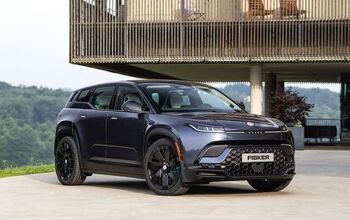Study Shows Red Light Cameras Reduce Accidents, so Why the Hate?

There’s few feelings more stomach-churning than looking up from your mirror (or radio) and seeing an amber light looming ahead. Do you go for it, or hit the brakes? If the intersection boats red light cameras, the potential fines make a good argument for mashing the pedal on the left.
That’s how the cameras are supposed to work, and a study by the Insurance Institute for Highway Safety finds they do just that. The paper, funded by auto insurers, says removing red light cameras at intersections leads to more collisions.
So, why are some cities scrapping their red light camera programs?
The paper compared annual crash rates in 14 U.S. cities that removed their red light cameras versus 33 similar cities that didn’t. Fatal crashes linked to red-light-running were 30 percent higher after removing the cameras, the study found. Crashes of all types went up 16 percent in those cities.
The IIHS claims red light running caused 709 deaths in 2014, a number most people would like to see lowered. Red light cameras seem like an obvious tool to boost safety, but they remain controversial.
According to Wen Hu, the study’s co-author, “the number of U.S. municipalities using red light camera enforcement increased rapidly before peaking in 2012 at 533 communities, by 2015 this number declined to 467 communities. Although new camera programs continued to be added, 158 communities ended their red light camera programs between 2010 and 2015.”
Why the distrust of potentially life-saving cameras? Blame local politicians, and their tendency to expand red light cameras to relatively safe intersections. When the ticket revenue goes to the city’s “general revenue” pile instead of safety programs, residents see red, as their elected officials see green.
In those cases, American Automobile Association research director Jake Nelson told the Associated Press, “you have to question what are we really doing here? Are we saving lives or are we raising money?”
No city hungers for red light cameras more than Chicago, which reaped hundreds of millions of dollars through its program. It was a windfall of new revenue — and controversy. That city’s red light camera roll-out proved a massive debacle.
Executives at the company supplying the initial crop of cameras were charged with bribing state officials and fraud. Irregularities in the amount of tickets issued on certain dates earned citizens’ distrust.
Last year, Chicago alderman Anthony Beale told the Chicago Sun-Times that public safety counts for only one-quarter of the program.
“It’s 75 percent revenue-driven,” said Beale. “But with the budget crunch we’re in now, it would be almost impossible to do away with any of them. We can’t afford to get rid of them.”
If communities want to grow public support to bring in (or keep) red light cameras, the onus is on politicians to prove it isn’t just a money grab.
[Image: Matthias Ripp/ Flickr]

More by Steph Willems
Latest Car Reviews
Read moreLatest Product Reviews
Read moreRecent Comments
- MaintenanceCosts This engine is a lot less interesting in a nearly-6000-pound Durango than in a 4400-pound Charger. I’ve never understood why this gen of Durango weighs in as heavy as a Wagoneer.
- Aja8888 I knew this would happen sooner or later. Others will follow.
- ToolGuy I read in TTAC that EVs are useless and dead, just sayin.
- ToolGuy I am starting to question the love for our planet expressed by the oligopolists. Have I been lied to?
- NigelShiftright My favorite color on any current car is the "McLaren orange" on Subaru Crosstreks. Unfortunately I am about four inches too tall to fit behind the wheel of one.


































Comments
Join the conversation
Two words... WA ZE
Why? Because the figures are misleading. Not only do they only count fatal crashes, they don't count the rear-end accidents (which, coincidentally, are usually not fatal) caused by people slamming on their brakes to avoid the ticket.